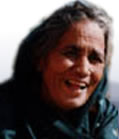 |
 |
||
 |
|||
|
RELATED THEMES communications education festivals spiritual beliefs traditional skills OTHER LOCAL THEMES BACKGROUND |
culture and customs
This collection of testimonies is particularly rich in detailed descriptions of cultural traditions, festivals, spiritual beliefs and practices. Although there is concern among some narrators about a decline in their culture and traditions, there is so much reference to continuing practices that the overall impression from the interviews is that many customs and beliefs remain very much alive. Above all, there is a sense of the strong links between the spiritual world and the physical environment. The mountainous region where the interviews were gathered is full of important religious sites, and many of the rituals described are about protecting or celebrating the sacred in trees, plants, rivers and other natural resources. Dependent on their surroundings for survival, people have imbued nature with religious significance; many festivals celebrate the seasons and the agricultural cycle. The testimonies were collected from different castes and religious groups and so a variety of customs and festivals are described. Most of the narrators are Hindu, but there are several Muslims and Buddhists. The Gujjars, used to a nomadic life but gradually settling, describe Muslim festivals and traditions including the non-consumption of alcohol, religious fasting and donations for the poor and needy. The customs and practices surrounding certain life cycle events but especially death, differ according to religion. One narrator describes differences in marriage ceremony according to caste. Traditional occupations are also referred to, such as those who play musical instruments, but several say the link between caste and occupation is beginning to break down, especially among lower castes who prefer to take on work which isn't associated with their social position. There is some difference of opinion over the extent to which customs are declining. India 9 is more positive than others and believes: "These functions are performed in the same manner [as they were in the past], that is, through mutual cooperation. Nobody is careless in this matter. People give respect to their ancient social traditions. They also extend their helping hands to their kith and kin. The new generation is treading in the footsteps of its ancestors." Others cite migration, improved access to education, increased engagement with the cash economy and with the outside world, especially through TV, as reasons for a weakening cultural identity. India 8 explains: "All are losing ground with the arrival of modern means of recreation like radios and TVs. All the traditional methods of entertainment and village fairs and local functions, ceremonies, are becoming things of the past. Steps should be taken to revive all these things, otherwise the culture will disappear." One narrator (India 25) concerned with maintaining traditions states: "We like our elders to live with us because they tell us about all the old customs and teachings. We have a belief that a household without seniors and with only children is no household." Two narrators talk about the custom in winter of people getting together in one house to weave and spin as a time when "The elders recite old proverbs and narrate anecdotes about the past" (India 17), but this practice too is said by some to be less common, as more people buy their clothes now than make their own. quotes about culture and customs".years ago people used to [wash the feet of their guests].the guest was also given a foot massage.Nowadays a bucket of warm water is given [to a visitor] to wash their hands and feet by themselves. No one does the massage anymore. People from outside spoke badly about the people of Jaunsar because of this custom. Now we offer hospitality, but not by washing the feet." "A few bedas ( traditional dancers) continue their occupation nowadays. Because of the spread of education and their better economic condition [others] have changed their occupation and have also settled elsewhere... With their disappearance our ancient culture is disappearing from the rural background. The traditional means of entertainment will disappear." "It snows heavily during December, January and February normally. Inside the house we burn logs of wood and stay indoors and weave and spin wool. Even the old men and women enjoy wool spinning. And as it has become a sort of tradition we crack jokes, tell stories, and exchange some real life anecdotes. This way the winter days go by. We manage to complete the spinning of wool and also protect ourselves from the severe cold weather." "When a son is born in a house, people go to congratulate all the elderly members of that house and offer them doob grass, which [the men] put on their caps and women on the scarves tied round their head. [Why?] A son continues the dynasty of the family [just as] the root of doob grass never dies. It grows anywhere and can survive in any condition. Therefore, people consider it a symbol of family succession and offer it with good wishes on the birth of a son." |
|